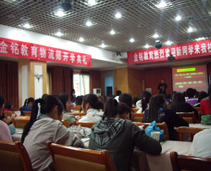
【英语四级】2010年6月英语四级听力详解
Part III Listening Comprehension (35 minutes)Section A
Directions: In this section, you will hear 8 short conversations and 2 long conversations .At the end of each conversation. One or more questions will be asked about what was said. Both the conversation and the questions will be spoken only once. After each question there will be a parse. During the parse. You must read the four choices marked A),B),C) and D), and decide which is the best answer. Then mark the corresponding letter on Answer Sheet 2 with a single line through the centre。
注意:此部分试题请在答题卡2上作答。
11.A)He has proved to be a better reader than the woman。
B)He has difficulty understanding the book。
C)He cannot get access to the assigned book。
D)He cannot finish his assignment before the deadline。
先从预览选项上看,A可以首先排除,后三项都在说有困难做某事/不能怎样,而A明显与后三不搭,再根据男女原则,the man也不可能是比这个女人更好的阅读者。听录音,关键词BUT, 明显是考察转折关系的变化,关注BUT 后的部分,是全题的提问关键。
12.A)She will drive the man to the supermarket。
B)The man should buy a car of his own。
C)The man needn’t go shopping every week。
D)She can pick the man up at the grocery store。
A&D基本说的是一个意思,都是这个女人开车载这个男人到某处(宾语可以关注,同时也可预测到这是个开车去购物的场景题);注意男人的I’d be happy to 和女人的why don’t … 成鲜明对比,主要考察反问句式
13.A)Get more food and drinks。
B)Ask his friend to come over。
C)Tidy up the place。
D)Hold a party。
首先预览选项可以推断出这是个和朋友开聚会的场景题(因为要准备吃的喝的,邀请朋友和收拾房间),但是听时较难,不易听出。主要听关键词和句,第一句男人的mess in here和后面女人的you’ll be doing most of today可判断出正确答案。考察听关键词和句然后判断
14.A)The talks can be held any day except this Friday。
B)He could change his schedule to meet John Smith。
C)The first-round talks should start as soon as possible。
D)The woman should contact John Smith first。
首先B选项可以排除,按照“办事情不顺利原则”B明显不是正确答案。“schedule”的发音虽然不熟悉,但是我相信在预览选项时考生们应该注意到了这一点,能够较易听出;本题考察了other than (除了)和 one day is as good as the next(哪天都一样)的短语搭配结构,注意as good as 连读了。
15.A)He understands the woman’s feelings。
B)He has gone through a similar experience。
C)The woman should have gone on the field trip. (应该继续)
D)The teacher is just following the regulations。
应用了虚拟语气“if I were you”这同样也表达了男人的观点,考察虚拟语气的建议句型
16.A)She will meet the man halfway。
B)She will ask David to talk less。
C)She is sorry the man will not come。
D)She has to invite David to the party。
又是考察转折关系的题, 注意BUT后就是此题的关键,答案往往就在BUT后,而且注意到the woman重读了insist, 更是此题的重中之重。
17.A)Few students understand Prof. Johnson’s lectures。
B)Few students meet Prof. Johnson’s requirements。
C)Many students find Prof. Johnson’s lectures boring。
D)Many students have dropped Prof. Johnson’s class。
看到选项中的lecture\ Professor\student 就能判断是学校场景中跟教授讲座有关的题目
18.A)Check their computer files。
B)Study a computer program。
C)Make some computations。
D)Assemble a computer。
依然是出现了转折性词BUT, 但是BUT 后较难听出答案,反而是第一个人的话能比较容易听出:put a computer together before (Assemble a computer=组装电脑),这句和D选项基本吻合,吻合程度越高的选项成为正确选项的可能性就越大;再听Q是问这两个说话者在谈论什么,所以第一个人的话就可以判断出答案了
和往年四级听力短对话理解题难度基本持平,还是重点考察了转折、建议、反问、虚拟语气等句型。
Questions 19 to 22 are based on the conversation you have just heard。
这个人初入职场,以谈话的形式在讲述他的第一份工作。注意对话的首尾,各出了一题:开头3轮对话回合都在谈论the man 的工作时间长短问题“①What sort of hours do you work?\Well I have to work very long hours, about 11 hours a day;②What time do you start?\I work 9 to 3~~~;③And do you have to work at the weekend?\ Yes, that’s ~~~”; 结尾出现了和选项相符的短语“Attention to detail”。20题A选项可以直接排除,这是个明显的体力工作,几乎没有脑力、智力方面的工作;B选项显然概括不全,因为他除了在厨房洗刷的工作外,还有别的陈述;C选项压根没有提及这种情况,所以D选项是概括出的正确答案
19.A)It allows him to make a lot of friends. (这个it 肯定是使这个人往好的方面发展了)
B)It requires him to work long hours。
C)It enables him to apply theory to practice。
D)It helps him understand people better。
20.A)It is intellectually challenging。(后三项说体力上的工作,A项说是智力上的挑战,A可直接排除)
B)It requires him to do washing-up all the time。
C)It exposes him to oily smoke all day long。
D)It demands physical endurance and patience。
21.A)In a hospital。
B)At a coffee shop。
C)At a laundry。
D)In a hotel。
22.A)Getting along well with colleagues。(B\C\D都是对这个工作的感受或心得;A指的是人际关系,)
B)Paying attention to every detail。
C)Planning everything in advance。
D)Knowing the needs of customers。
Questions 23 to 25 are based on the conversation you have just heard。
此对话两人对着数据表(table of figure)在谈论在英国的儿童的零用钱问题(pocket money)。依旧是首尾各出一题。23题B选项可以直接排除,因为大量的children & pocket money关键词的频频出现,根本不会是在说每年的英国通货膨胀率。24题A 选项也可直接排除,通过预览可以猜测出it在B\C\D情况中不是up就是down;而“Why do you think the rise in pocket money is often higher than inflation?\Perhaps parents in Britain are generous”是24题的答案关键,generous也是四级高频词汇。通过预览可以猜测出25题pocket money 的用处,所以the woman在结尾处的两个提问逐步引出25题:“if you had children, how much pocket money would you give them?\And would you expect them to do with it?”,这时考生需要引起注意了,the man 接着就回答时说了“to buy some personal things”,25题C选项是干扰项
23.A)The pocket money British children get。(B和其他三项不搭,可以排除)
B)The annual inflation rate in Britain。
C)The things British children spend money on。
D)The rising cost of raising a child in Britain。
24.A)It enables children to live better。(A和其他三项不搭)
B)It goes down during economic recession。
C)It often rises higher than inflation。
D)It has gone up 25% in the past decade。
25.A)Save up for their future education。
B)Pay for small personal things。
C)Buy their own shoes and socks。
D)Make donations when necessary。
Section B
Directions: In this section, you will hear 3 short passages. At the end of each passage, you will hear some questions. Both the passage and the questions will be spoken only once After you hear a question, you must choose the best answer from the four choice marked A),B),C) and D). Then mark the corresponding letter on Answer Sheet 2 with a single line through the centre。
注意:此部分试题请在答题卡2上作答。
Passage One
Questions 26 to 29 are based on the passage you have just heard。
篇章类题目还是需要关注文章开头3句和结尾3句,这两处是最易出题并且喜欢以原文出现答案。26题,开篇第一句就出示了答案:“Alex Gordon was looking forward to his first meeting with the company’s district managers”;30题第二句:“If your complaint is immediate, suppose you got the wrong order at a restaurant, make a polite but firm request to see the manager。”,后面还有几句在继续说这个问题,如果这句没听出来,可根据后面的意思也能猜测出答案,如:“Be polite. Shouting or acting rude will get you nowhere。”;33题开头第三句:“before Barbara had children, she worked as an architect for the government。”。另外,篇章1将近结尾处出现“Half of our managers are women。” 既是28题答案。篇章2结尾处也出现了“Be business-like and stick to the point. Don’t spend a paragraph on how your Uncle Joe tried to fix the problem and couldn’t”作者亦指出投诉要抓住要点,不要长篇大论。
“听到什么选什么原则”除了上面的26、28、30、32、33之外,篇章2出现“You are speaking to a voice coming from someone you can not see, so you can’t tell how the person on the line is reacting”,31题答案几乎原文出现;篇章3中段也同样出现了”If Barbara feels the need to do socially important work, he thinks that she should do volunteer work one or two days a week”, 所以34题正确答案“Do some volunteer work”。另外,35题原文中“not think…..can replace”被“is no replacement for…”替换。
整体篇章类没有特别较难的题目,难度自passage one 依次递减。三篇文章内容虽然有趣,但是做题游刃有余还是不容易,passage one 是三篇中较难的一篇,但是由于篇头篇尾规矩的以原文出现答案,降低了题目的难度。后两篇比较贴近生活,边听边看,确定哪个选项能够最大程度的吻合。Passage three 的话题与2006年12月份的真题 某篇章话题极为相似,再次印证了重复做历年真题的重要性。
26.A)District managers。
B)Regular customers。
C)Sales directors。
D)Senior clerks。
27.A)The support provided by the regular clients。
B)The initiative shown by the sales representatives。
C)The urgency of implementing the company’s plans。
D)The important part played by district managers。
28.A)Some of them were political-minded。
B)Fifty percent of them were female。
C)One third of them were senior managers。
D)Most of them were rather conservative。
29.A)He used too many quotations。
B)He was not gender sensitive。
C)He did not keep to the point。
D)He spent too much time on details。
Passage Two
Questions 30 to 32 are based on the passage you have just heard。
30.A)State your problem to the head waiter。
B)Demand a discount on the dishes ordered。
C)Ask to see the manager politely but firmly。
D)Ask the name of the person waiting on you。
31.A)Your problem may not be understood correctly。
B)You don’t know if you are complaining at the right time。
C)Your complaint may not reach the person in charge。
D)You can’t tell how the person on the line is reacting。
32.A)Demand a prompt response。
B)Provide all the details。
C)Send it by express mail。
D)Stick to the point。
Passage Three
Questions 33 to 35 are based on the passage you have just heard。
33.A)Fashion designer。
B)Architect。
C)City planner。
D)Engineer。
34.A)Do some volunteer work。
B)Work flexible hours。
C)Get a well-paid part-time job。
D)Go back to her previous post。
35.A)Few baby-sitters can be considered trustworthy。
B)It will add to the family’s financial burden。
C)A baby-sitter is no replacement for a mother。
D)The children won’t get along with a baby-sitter。
Section C
Directions: In this section, you will hear a passage three times. When the passage is read for the first time, you should listen carefully for its general idea. When the passage is read for the second time, you are required to fill in the blanks numbered from 36 to 43 with the exact words you have just heard, For blanks numbered form 44 to 46 you are required to fill in the missing information. For these blanks. You can either use the exact words you have just heard or write down the main points in your own works. Finally, when the passage is read for the third time, you should check what you have written。
注意:此部分试题请在答题卡2上作答。
单词部分,依旧考察了形容词、名词的拼写和动名词的使用,关键是由介词引起的动词-ing的变化,稍给题目增加些难度。36. curious, 38. independent, 39. unusual, 42. abstract 是前面系动词引起的填写形容词的情况;41. formal 是形容词来修饰后面的名词;较难部分是37和40题,分别是介词at 和by 引起后面动词变-ing 的情况,如果考生还很恍惚不知怎样填,可以看到37前and 并列的finding 和40 前and 并列的paying attention to, 就可判断出这两处是填写动名词的情况。43很显然是填写名词,但是考生是否能顺利听出mystery并且拼写正确?
句子部分,注意拼写appropriately和concepts,refining不易听出,是原型refine 的-ing形式。复合式听力的后三句子,是听力考试各题型中难度最高也是最能展示考生英语水平的题目,在这里还是希望同学们在掌握文都考试技巧的同时,课下多加练习,英语毕竟是能力的培养,我们考英语四级,也是为了证明自己的英语水平。
Almost every child, on the first day he sets foot in a school building, is smarter, more (36)curious,less afraid of what he doesn’t know, better at finding and (37)figuring things out, more confident, resourceful(机敏的), persistent and (38)independent than he will ever be again in his schooling-or, unless he is very (39) unusual and very lucky, for the rest of his life. Already, by paying close attention to and (40) interacting with the world and people around him, and without any school-type (41) formal instruction, he has done a task far more difficult, complicated and (42) abstract than anything he will be asked to do in school, or than any of his teachers has done for years. He has solved the (43) mystery of language. He has discovered it-babies don’t even know that language exists-and (44) and he has found how it works and learnt to use it appropriately. He has done it by exploring, by experimenting, by developing his own model of the grammar of language, (45) by trying it out and seeing whether it works, by changing (developing)it, refining it until it does work. And while he has been doing this, he has been learning other things as well, (46) including many of the concepts that schools think only they can teach them , and many that are more complicated than the ones they do try to teach him。
|
版权所有2005-2011 西安金铭职业培训学校(233.com) All Rights Reserved 陕ICP备11003236号
地址:陕西西安小寨东路196号国贸大厦7楼710室
乘车路线: 乘215路、19路、324路、600路、37路、603路、34路、14路、400路、229路到小寨站下车








